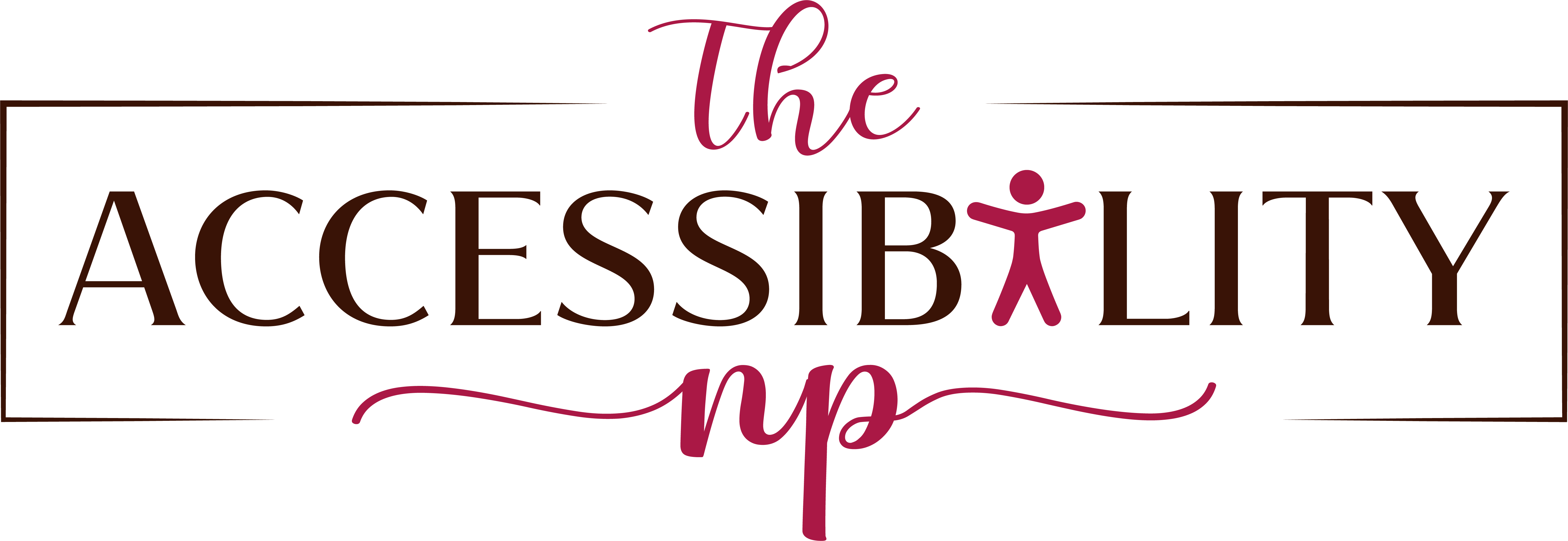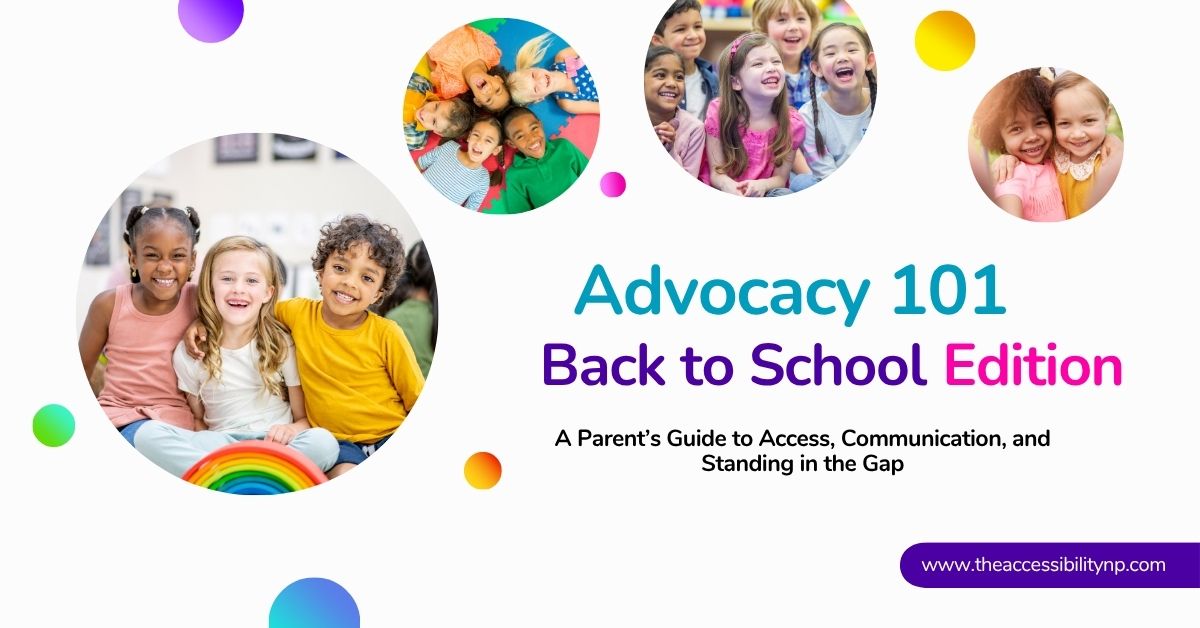The start of a new school year often comes with sharpened pencils, new shoes, and fresh beginnings—but for parents of disabled and neurodivergent students, it also comes with the emotional weight of advocacy. Whether your child is entering preschool, transitioning to middle school, or starting high school, you are not just getting them ready for class. You’re preparing to speak up, push through red tape, and ensure they receive the access, support, and dignity they deserve from day one.
Advocacy isn’t just about knowing the law—it’s about knowing your child, your rights, and how to build collaborative, respectful relationships with school teams that sometimes feel overwhelmed or underprepared.
This guide is here to walk you through the foundations of advocacy in a way that’s empowering, practical, and centered in love. Whether this is your first IEP meeting or your tenth, this is your reminder: you know your child best. You are their strongest advocate. And you are not alone.
Start with the Paperwork
Before you even set foot on campus, take time to get organized. The foundation of strong advocacy is documentation. When you’re organized, you’re more confident—and that confidence changes the tone of every interaction.
Make sure you have the most current versions of:
-
Your child’s IEP or 504 Plan
-
Evaluation reports (from school and any independent evaluators)
-
Medical or clinical documentation, if relevant
-
Communication logs (emails, notes, texts with school staff)
Keep these documents in a binder or digital folder that’s easy to access. Having your own copy allows you to compare goals, accommodations, and services as the year progresses.
And don’t wait until something goes wrong—review these documents before school starts. Are the supports listed still appropriate? Are goals meaningful and realistic? Is the AAC device, sensory support, or behavior plan clearly outlined?
Make Contact Early
Reach out to your child’s teacher(s), case manager, or support staff before the first day of school, if possible. A simple, friendly email can help you start off as a partner—not just a name on a file.
You don’t need to write a long story. Focus on what will help them support your child best:
-
A brief introduction of who your child is
-
What helps them feel safe and successful
-
Any major changes or concerns since the last school year
-
Communication preferences (email, phone, text)
This early connection is a chance to remind the team: your child is a whole person, not just a diagnosis or set of accommodations.
If your child uses an AAC device, has a BIP, or is coming back from a tough school year, it’s especially helpful to let staff know upfront. Give them tools for success.
Know What Access Really Means
Accommodations are not favors—they are legal rights. But more than that, they are the foundation of access.
Access is not just physical. It includes:
-
Instructional access (materials that match cognitive strengths)
-
Communication access (AAC, interpreters, visual supports)
-
Sensory access (calm spaces, regulation tools)
-
Emotional access (safe relationships, non-punitive discipline)
-
Social access (opportunities to participate with peers)
It’s not enough for your child to be in the room. Access means they can learn, communicate, and participate fully. If a support listed in their IEP isn’t happening, or if you notice your child withdrawing, refusing, or showing new behaviors—it might be an access issue, not a behavior one.
Build Relationships, Not Just Cases
We all know not every school relationship is smooth. Sometimes, advocacy feels exhausting because we’re constantly defending our child’s right to simply belong. But when we can build strong relationships with staff, it opens the door to more effective collaboration.
That doesn’t mean staying silent when things are wrong—it means choosing connection when possible.
Be clear and kind. When things go well, say thank you. If a teacher went out of their way to make your child feel included, send a short note. If a para supported your child’s meltdown with empathy, name that.
Positive relationships don’t erase the need for accountability. But they make hard conversations easier—and they remind teams that your child is a human being, not just another file in a stack.
Prepare for Meetings Before They Happen
If you have an IEP or 504 meeting scheduled—or even just a check-in—go in prepared.
Here are a few ways to strengthen your voice before the meeting:
-
Make a list of what’s working and what’s not
-
Gather input from outside providers or therapists
-
If your child is able, ask them how school feels, what they like, and what’s hard
-
Bring someone with you (a partner, friend, advocate, or even just another set of ears)
-
Write down your concerns and read them out loud before the meeting
You are not required to sign anything on the spot. If you feel rushed or uncertain, ask for time to review the document at home. You are allowed to ask questions, request data, or bring your own notes and goals.
This is not their meeting—it’s a team meeting. And you are part of the team.
Support Your Child’s Voice
As your child grows, they should be included in conversations about their education—even if they don’t use traditional speech.
Support their self-advocacy by:
-
Giving them access to communication tools that let them express preferences and needs
-
Letting them help make choices about accommodations, where possible
-
Affirming that their voice matters, even if it sounds different
For AAC users, this might mean programming phrases like:
-
“I need a break”
-
“I don’t understand”
-
“I like this”
-
“I feel nervous”
Modeling those options ahead of time gives your child language to use in the classroom.
When children learn that they are allowed to ask for help, refuse something overwhelming, or ask for more time—they begin to trust that their voice matters.
Don’t Be Afraid to Pause or Push Back
If something feels off, it probably is. You are allowed to say:
-
“I need more information before I agree to that.”
-
“That doesn’t feel like it supports my child.”
-
“I’d like to pause here and talk about this further later.”
-
“Can you show me where that’s written in the IEP?”
You do not have to agree just to avoid conflict. And you don’t have to accept less than what your child needs.
You also don’t need to know all the legal terms to stand in your child’s corner. You only need to know them—what helps them, what harms them, and what they’re capable of when barriers are removed.
Use Language That Centers Your Child
When you speak, frame things around access, not behavior. Around support, not control.
Instead of:
“He’s being noncompliant.”
Say: “He’s communicating that something isn’t working for him.”
Instead of:
“She’s just refusing to use her device.”
Say: “She may need more modeling or a regulated space to communicate.”
Instead of:
“He’s not ready for general education.”
Say: “What supports would make general ed more accessible for him?”
This reframing shifts the conversation from what your child lacks to what they deserve—and what the school needs to change to provide it.
Take Care of Yourself, Too
Advocacy is powerful. It’s also draining. You’re showing up for your child in meetings, conversations, and late-night email threads—but you deserve support, too.
Find people who get it. That might be other parents, support groups, a therapist, or online spaces that speak your language.
Rest when you can. Celebrate small wins. Document what went well. And know that even when it feels invisible, your advocacy matters.
You are not “too much.”
You are not asking for anything unreasonable.
You are asking for your child to be seen, supported, and respected.
And that’s what every student deserves.
Final Thoughts
Back-to-school season isn’t just about routines and supplies. It’s about setting the tone for how your child will be treated for the rest of the year. Your advocacy creates space—not just for your child, but for others whose voices haven’t been heard yet.
You don’t need to be perfect. You don’t need to be a lawyer or a speech pathologist. You just need to show up, speak with love, and keep pushing for what your child needs to learn and belong.
You are the expert on your child.
Your voice matters.
And this year, your advocacy will open doors.
—Yolanda
The Accessibility NP

